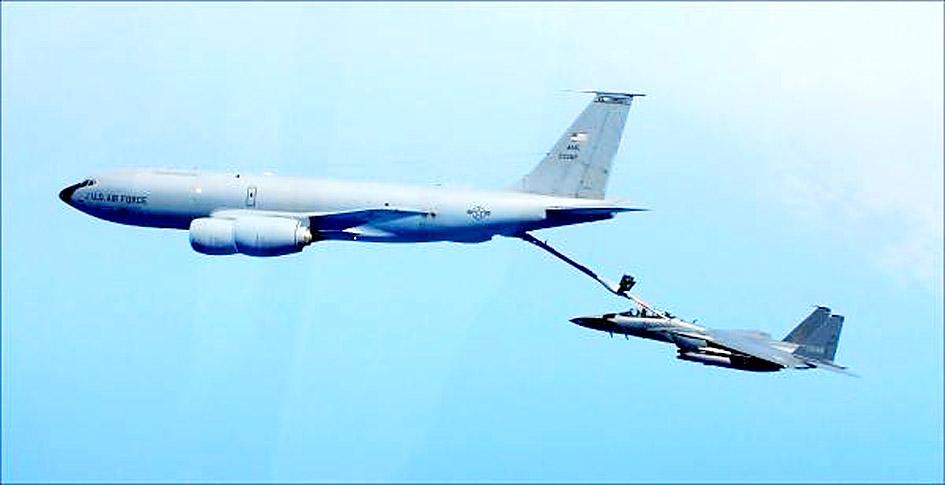A US aerial refueling aircraft came very close to an EVA Airways jet in the airspace over southern Taiwan, a military aviation news Web site said.
A report published by Alert 5 on Tuesday said that automatic dependent surveillance–broadcast (ADS-B) data captured by planfinder.net on Wednesday last week showed a US Air Force KC-135 tanker “coming less than 1,000 feet [305m] vertically with EVA Air flight BR225 as both aircraft crossed path south of Taiwan” that morning.
The report included an audio recording of a female controller from the Taipei air traffic control center telling the unidentified aircraft that it was interfering with flights in the Taipei flight information region.

Photo: Reuters
She also told the crew of the unidentified aircraft to contact the control center, the recording showed.
The incident was also reported on Wednesday by the South China Sea Strategic Situation Probing Initiative at Peking University’s Institute of Ocean Research, which tracks the US’ aerial reconnaissance activities in the region.
The Civil Aeronautics Administration (CAA) confirmed that the control center had detected both the US tanker and the EVA plane that day, adding that it had relayed the information to the EVA airplane and asked it to stay alert.
Because the unidentified aircraft did not respond to the control center’s request for identification, it was unable to ascertain its ownership, the CAA said.
EVA said that crew members on the BR225 flight from Taipei to Singapore were notified by a controller at the Taipei air traffic control center that there was an unidentified aircraft near its flight path.
The airplane continued on its designated route, and was not told to adjust its altitude or direction, EVA said.
It is fortunate that there were no casualties, but the increased activity by US military aircraft in the area, including refueling, poses more risk to aviation safety, strategy expert Chang Ching (張競) wrote on Facebook.
If the foreign news Web site did not disclose the incident, the public would not have known about it, Chang wrote, asking if the government tried to conceal it due to political considerations.

Chinese spouse and influencer Guan Guan’s (關關) residency permit has been revoked for repeatedly posting pro-China videos that threaten national security, the National Immigration Agency confirmed today. Guan Guan has said many controversial statements in her videos posted to Douyin (抖音), including “the red flag will soon be painted all over Taiwan” and “Taiwan is an inseparable part of China,” and expressing hope for expedited reunification. The agency last year received multiple reports alleging that Guan Guan had advocated for armed reunification. After verifying the reports, the agency last month issued a notice requiring her to appear and explain her actions. Guan

GIVE AND TAKE: Blood demand continues to rise each year, while fewer young donors are available due to the nation’s falling birthrate, a doctor said Blood donors can redeem points earned from donations to obtain limited edition Formosan black bear travel mugs, the Kaohsiung Blood Center said yesterday, as it announced a goal of stocking 20,000 units of blood prior to the Lunar New Year. The last month of the lunar year is National Blood Donation Month, when local centers seek to stockpile blood for use during the Lunar New Year holiday. The blood demand in southern Taiwan — including Tainan and Kaohsiung, as well as Chiayi, Pingtung, Penghu and Taitung counties — is about 2,000 units per day, the center said. The donation campaign aims to boost

The Kaohsiung Tourism Bureau audited six hotels in an effort to prevent price gouging ahead of Korean band BTS’ concert tour in the city scheduled for Nov. 19, 21 and 22 this year. The bureau on Friday said that the audits — conducted in response to allegations of unfair pricing posted on social media — found no wrongdoing. These establishments included the local branches of Chateau de Chine, Hotel Nikko, My Humble House, and Grand Hai Lai, it said, adding that the Consumer Protection Commission would have penalized price gougers had the accusations been substantiated. The bureau said the Tourism Development Act

BACK TO WINTER: A strong continental cold air mass would move south on Tuesday next week, bringing colder temperatures to northern and central Taiwan A tropical depression east of the Philippines could soon be upgraded to be the first tropical storm of this year, the Central Weather Administration (CWA) said yesterday, adding that the next cold air mass is forecast to arrive on Monday next week. CWA forecaster Cheng Jie-ren (鄭傑仁) said the first tropical depression of this year is over waters east of the Philippines, about 1,867km southeast of Oluanpi (鵝鑾鼻), and could strengthen into Tropical Storm Nokaen by early today. The system is moving slowly from northwest to north, and is expected to remain east of the Philippines with little chance of affecting Taiwan,